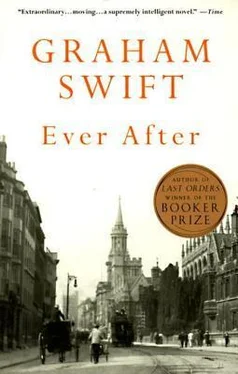These things seemed to me to belong to some distant era, even to the realms of legend, and I confused in my mind Sir John Moore’s army with the gathered bands of the Israelites at Hebron, which must have been at the time the subject of my Scripture readings with my mother. As for the Emperor of the French—“Boney,” as he was called then — he seemed to me a figure entirely out of fable, out of commedia dell’arte or Punch and Judy. And this, perhaps, was how my mother conceived of him even as she beheld him, for she would insist — and I will never know if this were some nice embellishment on her part — that as she was rowed with my grandparents by the stern of the warship, the Emperor, in full view on the quarter-deck, raised his hat and smiled, expressly at her .
“How are the mighty fallen” was her gloss on this little digression. So we continued on our path through the Old Testament. How strange to think that three times as many years have now passed since she related these things as had elapsed then from the events which she recounted. And what an age it seems since I heard her voice and since I sat beside her at our parlour table with the Bible between us.
The time may come, my dear Liz — perhaps it has come for you already — when it will seem just as long ago, just such a thing of fable, that we ever married and shared life together. But come what may, dearest Liz, you may trust that, as I revere still in my memory my poor mother — who showed me the way to a world that can no longer be mine — so will you always be remembered by
Your loving
Matthew
I was born in December 1936, in the very week that a King of England gave up his crown in order to marry the woman he loved. Naturally, I knew nothing about this at the time and, of course, other events than the Abdication Crisis were then at large in the world. But I have always felt that the timing of my arrival imbued my life, for better or worse, with a sort of fairy-tale propensity. I have always had a soft spot (a naïve view, I know) for the throneless ex-king sitting it out on the Riviera. And I have often wondered whether my mother’s pangs with me on that December day were eased by that concurrent event which must have been viewed by many, rather than as a crisis, as a welcome intrusion of Romance, allowing them fondly to forget for a moment Hitler, Mussolini and Franco. All for Love. Or, the World Well Lost. “Let … the wide arch of the ranged empire fall!” (As indeed it began to do under poor, put-upon George VI.) All for love, yes. Amor vincit …
And Paris, fairy-tale city, might have endorsed the point. Paris, with its enchanted streets and eternal air of licensed felicity, might have taken me to its heart. Was there any other city in the world in which to live but Paris? (I thought this even aged nine.) I might have become one of those countless aspirants who have flocked to the city by the Seine and become great artists, great dreamers or great liars. I might have become, trained in the free school of my mother and Sam, a great boulevardier , a great philanderer. I might have lived the life of Riley. But my father died before I had even passed the gates of puberty. And what I became was — bookish.
Though this did not happen immediately. If the truth be known, when we returned to England I didn’t grieve for my dead father. I didn’t want to grieve for him. I didn’t want to think of him. I didn’t want to think of my father as the man who had fired a gun at his head. I grieved for my adorable ballet-girls, who by this stage had received honorary names — delicious, seductive French names, Yvette, Simone, Michelle — who, even then, were alive and literally kicking, stretching their beautiful limbs in the ballet school, utterly ignorant of my distant worship and entirely without need of it.
And this was not a good time for grief. Or rather, it was a very good time for grief, which made one little parcel of it unexceptional and negligible. People had got used in recent times to the fact that every so often, so it seemed, nature required a culling, and thus to mixing a little callousness with their sorrow. Perhaps it was only after my father’s demise that the war, which I had lived through but conceived of as some remote, rumbling, impenetrably grown-up affair, became real for me. It was about death: slaughter, bodies, casualty lists.
And if I did not grasp the general point, I had the specific reminder of Ed. Shot down, aged nineteen-and-a-half, over the blue Pacific. That photo of his grinning brother became Sam’s trump card. How could I take out my feelings on Sam, how could I unleash on him all the venom due an arrant usurper (a murderer in all but name), when he neatly reminded me that we were companions in the same grim business of bereavement?
And what was an “accident” with a pistol in a Paris office to the Battle of the Coral Sea? (“Yep, a lot of brave boys went down.…”—his sentence would end in a mimetic gulp.) And what was my father’s death to the deaths of the fathers of other boys (I met them, these high-grade orphans) who had died, as the saying went, “in action?” My father, soldier though he was, had died in circumstances which required from me either a considerable degree of risky inventiveness or a suspect, rumour-breeding silence.
And how could I deny — for all his exploitation of it — Sam’s plight? You are twenty-one years old, happily exempted, for complex reasons of primogeniture and your father’s involvement in a new and militarily useful industry (“Perspex, pal — you heard about perspex?”) from armed service. But your younger brother, your little kid brother, Ed, joins up, learns to fly and is killed. It might have been you, you think: it should have been you. Whatever you do now will be over your brother’s dead, sea-shrouded body. You have to live for Ed now; to take on all Ed’s lost chances (and Ed was great with the girls; they just fell over him). To become a perpetual nineteen-year-old …
“Sure — it’s tough. I know. It hits you hard,” was the extent of his attempts to sound out the measure of my sorrow and show his willingness, if necessary, to console. I have to admit he handled with a degree of delicacy the problem of disguising his relief that I didn’t appear to be hopelessly distraught, while preparing for the onset of a possibly vicious delayed reaction. And there was, in any case, that air of frank confidingness (so unlike my father), that bluff disavowal — I’m sorry if I have no conscience, if I have no shame, but it’s not my fault — that thick-skinned, businessman’s charm.
But I knew just how thick-skinned he really was. I had seen him with his hand trembling — I would see him, twice again in my life, with his face as drained of vigour as it was on that day. I knew his weakness. His tactical strength was his strategic disadvantage. Even I could see that, with all its fraught implications, with all its dangerous blend of the expedient and the needful, Sam saw in me a bizarre substitute for Ed. (And you gotta have substitutes.) That he side-stepped the dread question of his surrogate paternity — not to say his entire adult responsibilities — by this appeal to the chummily fraternal.
And he was right to prepare for a delayed reaction. He underestimated, that’s all, the extent of the delay and the persistence of the reaction. It seems that I’m a slow burner, a long-term investor of emotions.
We returned, briefly, to Berkshire in April ’46, to follow my father’s coffin, then permanently in June to settle in his home. I had a strong sense now of its being “my father’s house” rather than “home,” though my mother rapidly began asserting her proprietorial rights. Furniture was replaced. Decorators appeared. There was plainly money on tap. The little gallery of framed photographs from above the sideboard, recording the “India days” (cane chairs; verandahs; turbans; polo sticks) disappeared one morning in the van of a man collecting for a jumble sale. I did not believe, any more than my mother, that the place should become a shrine to her husband’s memory, but I felt the injustice. And I felt, as the physical remnants of my father were whittled away, the accretion, as it were, of his ghostly stock. It was his house. He may not have earned his plot in the ethereal fields of fame, but he had left this solid enough memorial. It was the husk of his life.
Читать дальше












